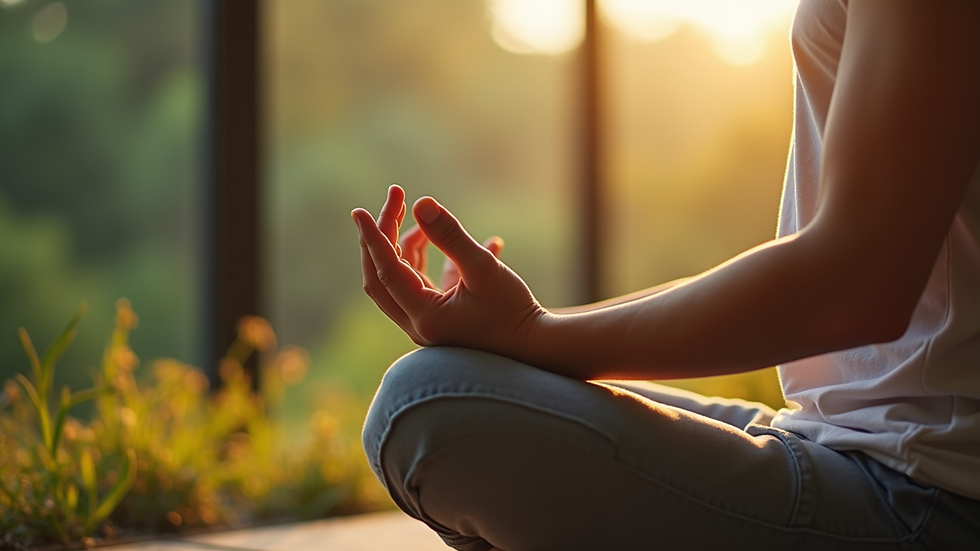Empower Your Mind with Holistic Healing Techniques
- Carrie Mosley
- Jul 19
- 6 min read
In today's fast-paced world, many of us find ourselves overwhelmed and stressed. The constant demands of work, family, and social obligations can take a toll on our mental health. Fortunately, holistic healing techniques offer a way to empower your mind and restore balance. These methods focus on treating the whole person, not just the symptoms. By incorporating holistic practices into your daily routine, you can enhance your mental well-being and cultivate a more peaceful state of mind.
Holistic healing encompasses various practices, including meditation, yoga, aromatherapy, and mindfulness. Each technique has its unique benefits, and together they can create a powerful toolkit for mental empowerment. In this blog post, we will explore these techniques in detail, providing practical tips and examples to help you get started on your holistic healing journey.
Understanding Holistic Healing
Holistic healing is based on the idea that our mind, body, and spirit are interconnected. When one aspect is out of balance, it can affect the others. This approach encourages us to look at the bigger picture and address the root causes of our issues rather than just treating the symptoms.
By focusing on the whole person, holistic healing promotes overall well-being. It encourages self-awareness and personal growth, allowing individuals to take charge of their health. This empowerment can lead to improved mental clarity, emotional stability, and a greater sense of purpose.
The Power of Meditation
Meditation is one of the most effective holistic healing techniques. It involves focusing your mind and eliminating distractions to achieve a state of calm and clarity. Regular meditation practice can reduce stress, improve concentration, and enhance emotional well-being.
Getting Started with Meditation
Find a Quiet Space: Choose a comfortable spot where you won't be disturbed. This could be a corner of your home, a park, or anywhere you feel at ease.
Set a Timer: Start with just five minutes a day. As you become more comfortable, gradually increase the time.
Focus on Your Breath: Close your eyes and take deep breaths. Inhale through your nose, hold for a moment, and exhale through your mouth. Focus on the rhythm of your breath.
Let Thoughts Pass: If your mind wanders, gently bring your focus back to your breath. It's normal for thoughts to arise; just acknowledge them and let them go.
Practice Regularly: Consistency is key. Try to meditate at the same time each day to build a habit.
Meditation can be a powerful tool for mental empowerment. It helps you develop a greater awareness of your thoughts and emotions, allowing you to respond rather than react to stressors.
Embracing Yoga for Mindfulness
Yoga is another holistic practice that combines physical movement, breath control, and meditation. It promotes mindfulness and helps to connect the mind and body. Regular yoga practice can improve flexibility, strength, and mental clarity.
Simple Yoga Poses to Try
Child's Pose: This gentle pose helps to relax the mind and relieve tension. Kneel on the floor, sit back on your heels, and stretch your arms forward on the ground.
Cat-Cow Stretch: This pose helps to release tension in the spine. Start on your hands and knees. Inhale as you arch your back (cow), and exhale as you round your back (cat).
Warrior II: This pose builds strength and confidence. Stand with your feet wide apart, turn one foot out, and bend that knee while extending your arms parallel to the ground.
Corpse Pose: This final relaxation pose allows you to absorb the benefits of your practice. Lie flat on your back, arms at your sides, and focus on your breath.
Incorporating yoga into your routine can enhance your mental resilience. It encourages mindfulness and helps you stay present in the moment.
The Benefits of Aromatherapy
Aromatherapy uses essential oils to promote physical and emotional well-being. Different scents can have various effects on our mood and mental state. For example, lavender is known for its calming properties, while citrus scents can uplift and energize.
How to Use Aromatherapy
Diffusers: Use an essential oil diffuser to disperse scents throughout your space. This creates a calming atmosphere.
Inhalation: Place a few drops of essential oil on a cotton ball and inhale deeply. This can provide immediate relief from stress.
Baths: Add a few drops of essential oil to your bathwater for a relaxing experience. Eucalyptus oil can help clear your mind, while chamomile can promote relaxation.
Massage: Mix essential oils with a carrier oil and use them for self-massage. This can help relieve tension and promote relaxation.
Aromatherapy can be a simple yet effective way to enhance your mental well-being. The right scents can help you feel more grounded and centered.
Practicing Mindfulness in Daily Life
Mindfulness is the practice of being present in the moment. It involves paying attention to your thoughts, feelings, and surroundings without judgment. By cultivating mindfulness, you can reduce stress and improve your overall mental health.
Tips for Practicing Mindfulness
Mindful Eating: Take time to savor your meals. Focus on the flavors, textures, and aromas of your food. This can help you develop a healthier relationship with food.
Mindful Walking: When you walk, pay attention to each step. Notice how your feet feel on the ground and the sensations in your body. This can help you feel more connected to your surroundings.
Gratitude Journaling: Take a few minutes each day to write down things you are grateful for. This practice can shift your focus from negativity to positivity.
Breath Awareness: Throughout the day, take a moment to check in with your breath. Notice how it feels and take a few deep breaths to center yourself.
Incorporating mindfulness into your daily routine can help you manage stress and improve your mental clarity. It encourages you to live in the present moment and appreciate life as it unfolds.
Building a Supportive Community
Holistic healing is often more effective when shared with others. Building a supportive community can enhance your journey toward mental empowerment. Surrounding yourself with like-minded individuals can provide encouragement, motivation, and accountability.
Ways to Connect with Others
Join a Class: Look for local yoga or meditation classes. This is a great way to meet people who share your interests.
Online Communities: Explore online forums or social media groups focused on holistic healing. These platforms can provide support and resources.
Workshops and Retreats: Attend workshops or retreats that focus on holistic practices. These events can deepen your understanding and connect you with others.
Share Your Journey: Talk about your experiences with friends and family. Sharing your journey can inspire others and create a supportive environment.
Building a community around holistic healing can enhance your experience and provide valuable support. It can also help you stay motivated and committed to your practices.
Embracing a Holistic Lifestyle
To truly empower your mind, consider adopting a holistic lifestyle. This means making choices that support your overall well-being. It involves being mindful of what you consume, how you move, and how you care for your mental health.
Tips for a Holistic Lifestyle
Eat Whole Foods: Focus on a diet rich in fruits, vegetables, whole grains, and lean proteins. This can nourish your body and mind.
Stay Active: Incorporate regular physical activity into your routine. This can be anything from walking to dancing to yoga.
Limit Screen Time: Take breaks from screens to reduce mental fatigue. Spend time outdoors or engage in creative activities.
Prioritize Sleep: Ensure you get enough restful sleep each night. Establish a calming bedtime routine to promote better sleep quality.
Practice Self-Care: Make time for activities that bring you joy and relaxation. This could be reading, gardening, or spending time with loved ones.
By embracing a holistic lifestyle, you can create a foundation for mental empowerment. It encourages you to take an active role in your well-being and make choices that support your overall health.
Your Journey to Empowerment
Empowering your mind through holistic healing techniques is a personal journey. It requires patience, practice, and self-compassion. Remember that everyone's path is unique, and what works for one person may not work for another.
As you explore these techniques, be open to trying new things and finding what resonates with you. Whether it's meditation, yoga, aromatherapy, or mindfulness, each practice can contribute to your overall well-being.

As you embark on this journey, celebrate your progress and be kind to yourself. Empowering your mind is not about perfection; it is about growth and self-discovery.
By integrating holistic healing techniques into your life, you can cultivate a greater sense of peace, clarity, and purpose. Embrace the journey, and let it lead you to a more empowered and fulfilling life.


Comments